Research Report: Entrepreneurial Mindset Dimensions in Ventures
VerifiedAdded on 2023/06/11
|18
|4062
|451
Report
AI Summary
This research report investigates the core dimensions of an entrepreneurial mindset across various entrepreneurial contexts, including startups, small and large organizations, charities, social enterprises, and government entities. It employs qualitative analysis derived from entrepreneurial interviews to understand how entrepreneurs express learning as a foundation for their mindset. The report compares and contrasts these findings with existing literature and other interviews, focusing on experiential learning, critical incidents, and the role of reflection. Furthermore, it includes a reflective section detailing how learning from others has influenced the author's mindset and potential for improvement. The study utilizes an interview with an entrepreneur, Mr. Kunal Sharma, to gather primary data and explores themes such as the motivation behind starting a company, adapting to change, and viewing challenges as opportunities. The methodology section outlines the research philosophy, approach, strategy, and data collection methods used to ensure the validity and reliability of the findings. The research concludes that while experiential learning is crucial, the capacity to optimize expertise through critical episodes may not always guarantee success, suggesting a need for further study in this area. This report highlights the complex nature of entrepreneurial learning and the importance of understanding the cognitive filters that drive entrepreneurial actions.
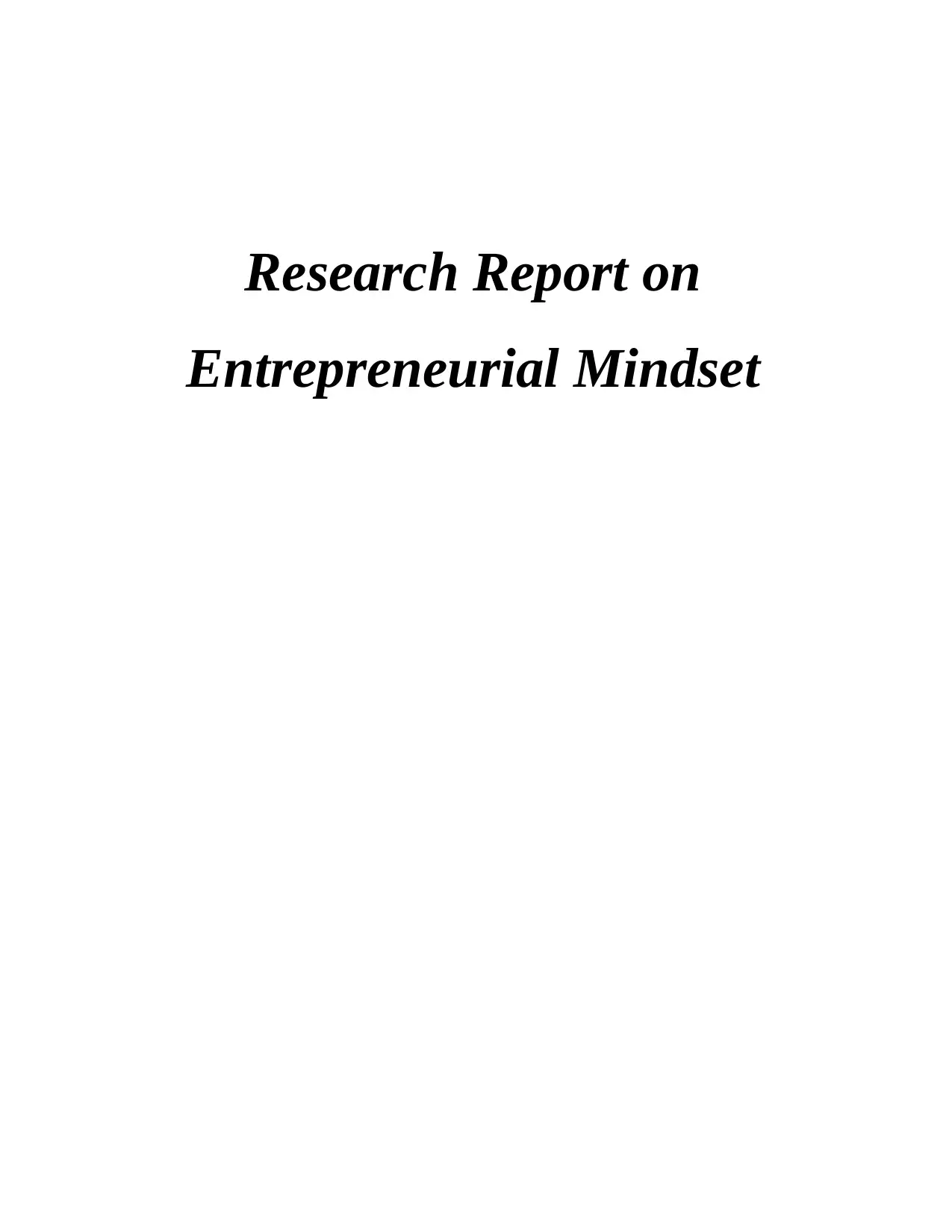
Research Report on
Entrepreneurial Mindset
Entrepreneurial Mindset
Paraphrase This Document
Need a fresh take? Get an instant paraphrase of this document with our AI Paraphraser
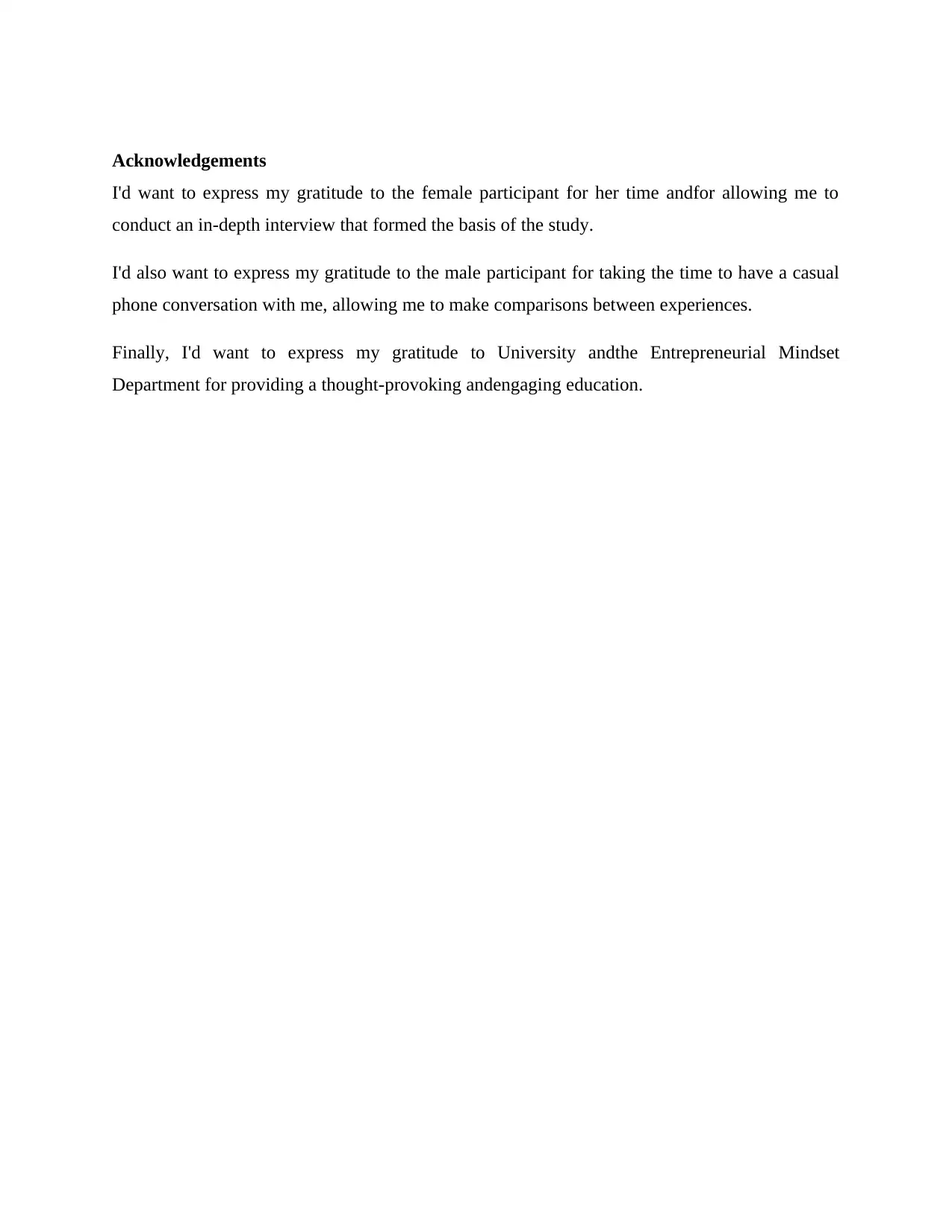
Acknowledgements
I'd want to express my gratitude to the female participant for her time andfor allowing me to
conduct an in-depth interview that formed the basis of the study.
I'd also want to express my gratitude to the male participant for taking the time to have a casual
phone conversation with me, allowing me to make comparisons between experiences.
Finally, I'd want to express my gratitude to University andthe Entrepreneurial Mindset
Department for providing a thought-provoking andengaging education.
I'd want to express my gratitude to the female participant for her time andfor allowing me to
conduct an in-depth interview that formed the basis of the study.
I'd also want to express my gratitude to the male participant for taking the time to have a casual
phone conversation with me, allowing me to make comparisons between experiences.
Finally, I'd want to express my gratitude to University andthe Entrepreneurial Mindset
Department for providing a thought-provoking andengaging education.
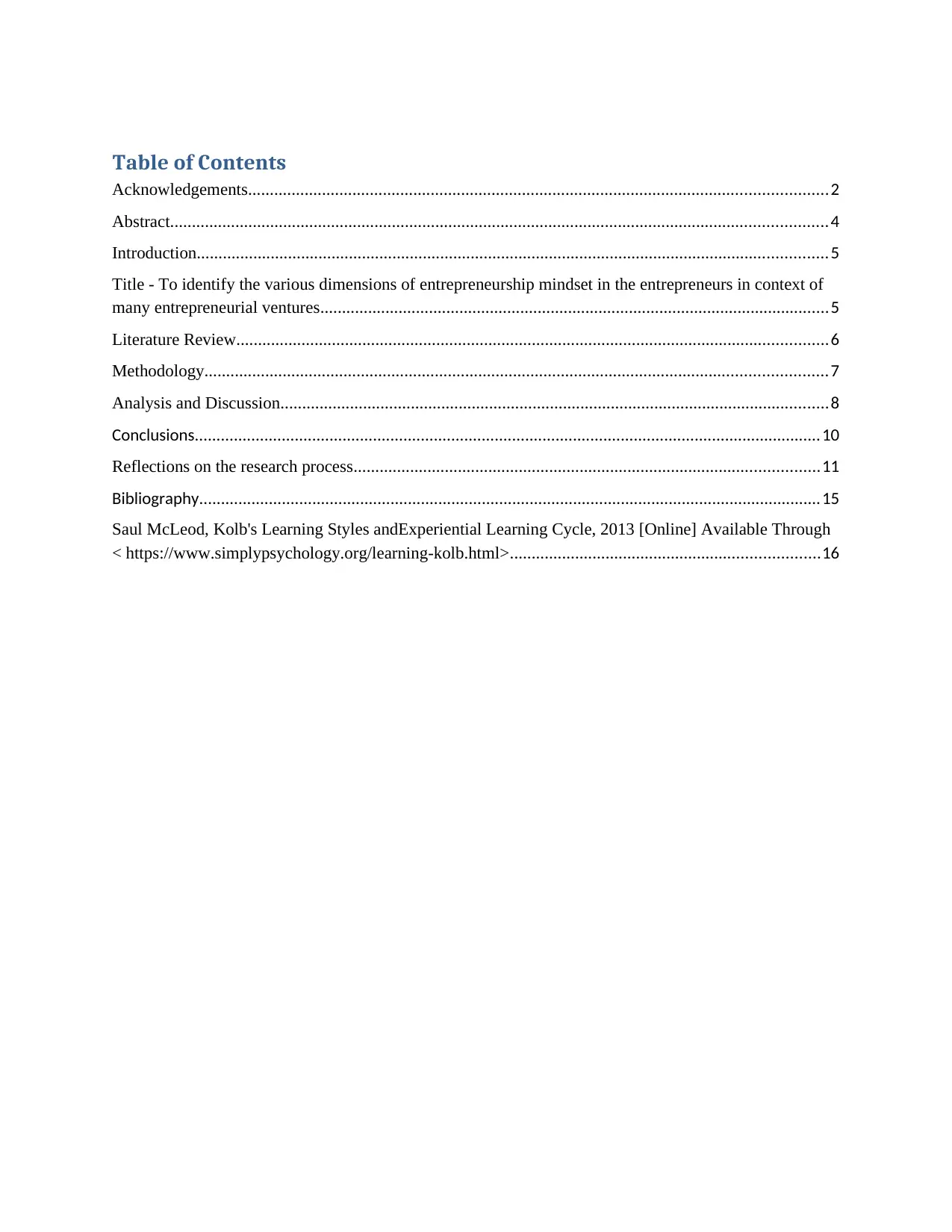
Table of Contents
Acknowledgements.....................................................................................................................................2
Abstract.......................................................................................................................................................4
Introduction.................................................................................................................................................5
Title - To identify the various dimensions of entrepreneurship mindset in the entrepreneurs in context of
many entrepreneurial ventures.....................................................................................................................5
Literature Review........................................................................................................................................6
Methodology...............................................................................................................................................7
Analysis and Discussion..............................................................................................................................8
Conclusions................................................................................................................................................10
Reflections on the research process...........................................................................................................11
Bibliography...............................................................................................................................................15
Saul McLeod, Kolb's Learning Styles andExperiential Learning Cycle, 2013 [Online] Available Through
< https://www.simplypsychology.org/learning-kolb.html>.......................................................................16
Acknowledgements.....................................................................................................................................2
Abstract.......................................................................................................................................................4
Introduction.................................................................................................................................................5
Title - To identify the various dimensions of entrepreneurship mindset in the entrepreneurs in context of
many entrepreneurial ventures.....................................................................................................................5
Literature Review........................................................................................................................................6
Methodology...............................................................................................................................................7
Analysis and Discussion..............................................................................................................................8
Conclusions................................................................................................................................................10
Reflections on the research process...........................................................................................................11
Bibliography...............................................................................................................................................15
Saul McLeod, Kolb's Learning Styles andExperiential Learning Cycle, 2013 [Online] Available Through
< https://www.simplypsychology.org/learning-kolb.html>.......................................................................16
⊘ This is a preview!⊘
Do you want full access?
Subscribe today to unlock all pages.

Trusted by 1+ million students worldwide
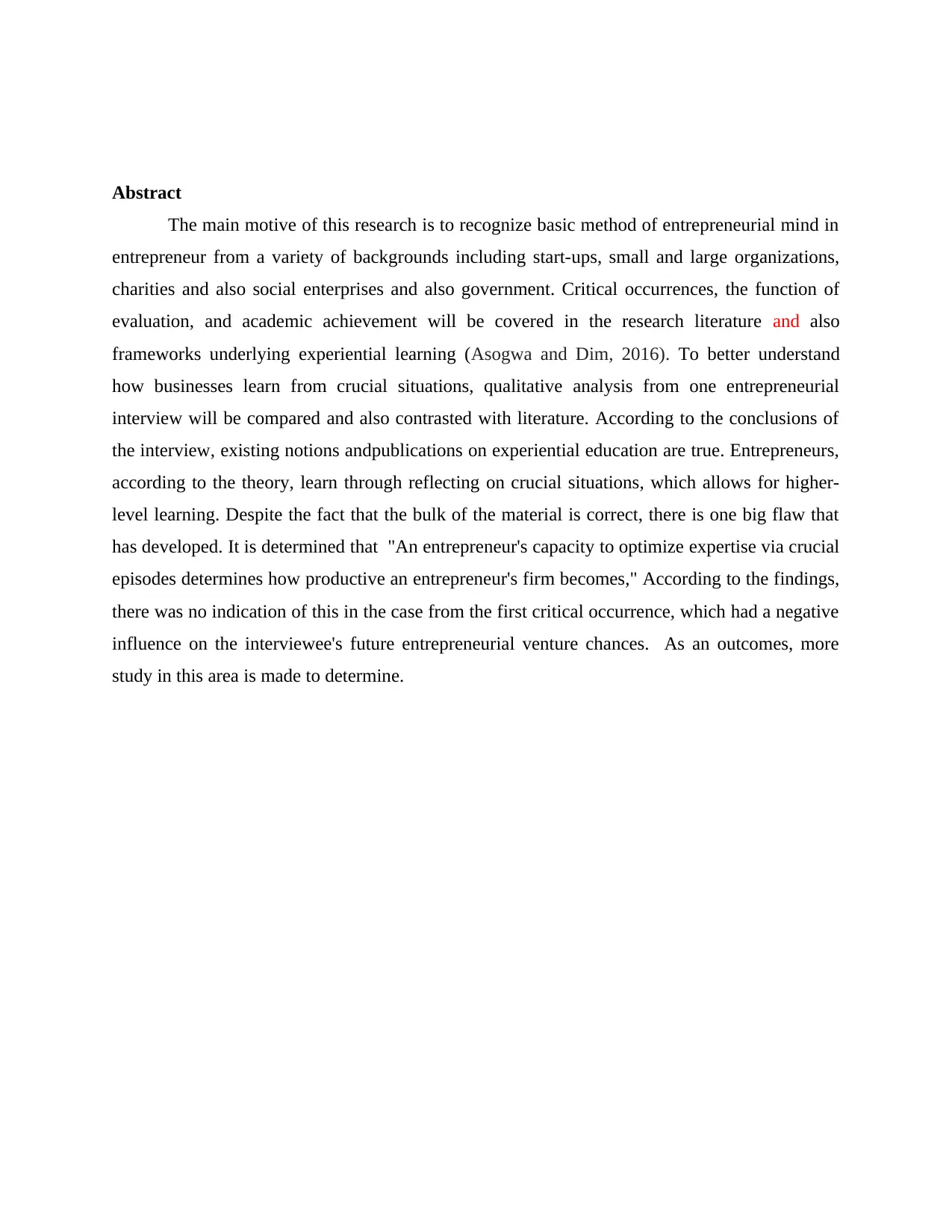
Abstract
The main motive of this research is to recognize basic method of entrepreneurial mind in
entrepreneur from a variety of backgrounds including start-ups, small and large organizations,
charities and also social enterprises and also government. Critical occurrences, the function of
evaluation, and academic achievement will be covered in the research literature and also
frameworks underlying experiential learning (Asogwa and Dim, 2016). To better understand
how businesses learn from crucial situations, qualitative analysis from one entrepreneurial
interview will be compared and also contrasted with literature. According to the conclusions of
the interview, existing notions andpublications on experiential education are true. Entrepreneurs,
according to the theory, learn through reflecting on crucial situations, which allows for higher-
level learning. Despite the fact that the bulk of the material is correct, there is one big flaw that
has developed. It is determined that "An entrepreneur's capacity to optimize expertise via crucial
episodes determines how productive an entrepreneur's firm becomes," According to the findings,
there was no indication of this in the case from the first critical occurrence, which had a negative
influence on the interviewee's future entrepreneurial venture chances. As an outcomes, more
study in this area is made to determine.
The main motive of this research is to recognize basic method of entrepreneurial mind in
entrepreneur from a variety of backgrounds including start-ups, small and large organizations,
charities and also social enterprises and also government. Critical occurrences, the function of
evaluation, and academic achievement will be covered in the research literature and also
frameworks underlying experiential learning (Asogwa and Dim, 2016). To better understand
how businesses learn from crucial situations, qualitative analysis from one entrepreneurial
interview will be compared and also contrasted with literature. According to the conclusions of
the interview, existing notions andpublications on experiential education are true. Entrepreneurs,
according to the theory, learn through reflecting on crucial situations, which allows for higher-
level learning. Despite the fact that the bulk of the material is correct, there is one big flaw that
has developed. It is determined that "An entrepreneur's capacity to optimize expertise via crucial
episodes determines how productive an entrepreneur's firm becomes," According to the findings,
there was no indication of this in the case from the first critical occurrence, which had a negative
influence on the interviewee's future entrepreneurial venture chances. As an outcomes, more
study in this area is made to determine.
Paraphrase This Document
Need a fresh take? Get an instant paraphrase of this document with our AI Paraphraser

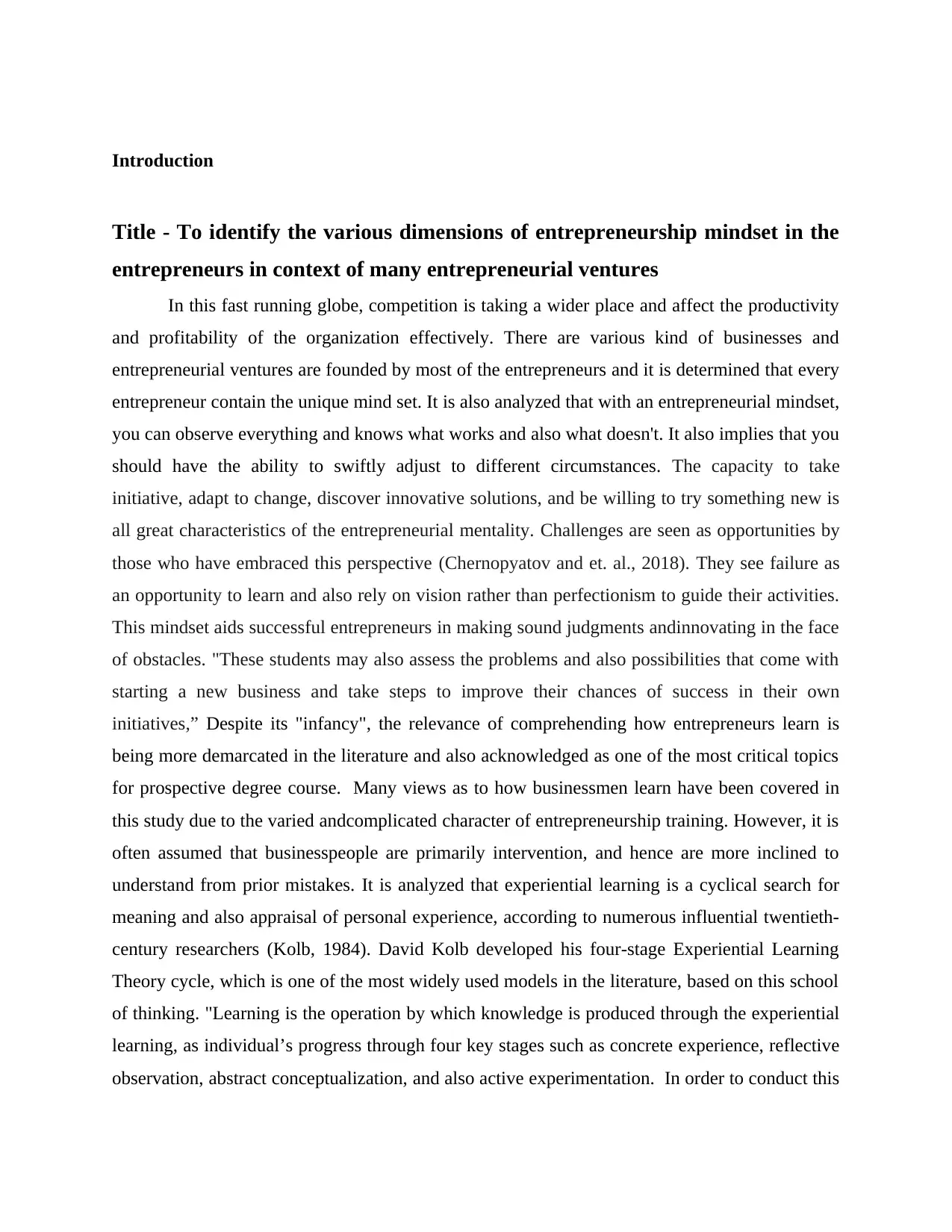
Introduction
Title - To identify the various dimensions of entrepreneurship mindset in the
entrepreneurs in context of many entrepreneurial ventures
In this fast running globe, competition is taking a wider place and affect the productivity
and profitability of the organization effectively. There are various kind of businesses and
entrepreneurial ventures are founded by most of the entrepreneurs and it is determined that every
entrepreneur contain the unique mind set. It is also analyzed that with an entrepreneurial mindset,
you can observe everything and knows what works and also what doesn't. It also implies that you
should have the ability to swiftly adjust to different circumstances. The capacity to take
initiative, adapt to change, discover innovative solutions, and be willing to try something new is
all great characteristics of the entrepreneurial mentality. Challenges are seen as opportunities by
those who have embraced this perspective (Chernopyatov and et. al., 2018). They see failure as
an opportunity to learn and also rely on vision rather than perfectionism to guide their activities.
This mindset aids successful entrepreneurs in making sound judgments andinnovating in the face
of obstacles. "These students may also assess the problems and also possibilities that come with
starting a new business and take steps to improve their chances of success in their own
initiatives,” Despite its "infancy", the relevance of comprehending how entrepreneurs learn is
being more demarcated in the literature and also acknowledged as one of the most critical topics
for prospective degree course. Many views as to how businessmen learn have been covered in
this study due to the varied andcomplicated character of entrepreneurship training. However, it is
often assumed that businesspeople are primarily intervention, and hence are more inclined to
understand from prior mistakes. It is analyzed that experiential learning is a cyclical search for
meaning and also appraisal of personal experience, according to numerous influential twentieth-
century researchers (Kolb, 1984). David Kolb developed his four-stage Experiential Learning
Theory cycle, which is one of the most widely used models in the literature, based on this school
of thinking. "Learning is the operation by which knowledge is produced through the experiential
learning, as individual’s progress through four key stages such as concrete experience, reflective
observation, abstract conceptualization, and also active experimentation. In order to conduct this
Title - To identify the various dimensions of entrepreneurship mindset in the
entrepreneurs in context of many entrepreneurial ventures
In this fast running globe, competition is taking a wider place and affect the productivity
and profitability of the organization effectively. There are various kind of businesses and
entrepreneurial ventures are founded by most of the entrepreneurs and it is determined that every
entrepreneur contain the unique mind set. It is also analyzed that with an entrepreneurial mindset,
you can observe everything and knows what works and also what doesn't. It also implies that you
should have the ability to swiftly adjust to different circumstances. The capacity to take
initiative, adapt to change, discover innovative solutions, and be willing to try something new is
all great characteristics of the entrepreneurial mentality. Challenges are seen as opportunities by
those who have embraced this perspective (Chernopyatov and et. al., 2018). They see failure as
an opportunity to learn and also rely on vision rather than perfectionism to guide their activities.
This mindset aids successful entrepreneurs in making sound judgments andinnovating in the face
of obstacles. "These students may also assess the problems and also possibilities that come with
starting a new business and take steps to improve their chances of success in their own
initiatives,” Despite its "infancy", the relevance of comprehending how entrepreneurs learn is
being more demarcated in the literature and also acknowledged as one of the most critical topics
for prospective degree course. Many views as to how businessmen learn have been covered in
this study due to the varied andcomplicated character of entrepreneurship training. However, it is
often assumed that businesspeople are primarily intervention, and hence are more inclined to
understand from prior mistakes. It is analyzed that experiential learning is a cyclical search for
meaning and also appraisal of personal experience, according to numerous influential twentieth-
century researchers (Kolb, 1984). David Kolb developed his four-stage Experiential Learning
Theory cycle, which is one of the most widely used models in the literature, based on this school
of thinking. "Learning is the operation by which knowledge is produced through the experiential
learning, as individual’s progress through four key stages such as concrete experience, reflective
observation, abstract conceptualization, and also active experimentation. In order to conduct this
⊘ This is a preview!⊘
Do you want full access?
Subscribe today to unlock all pages.

Trusted by 1+ million students worldwide
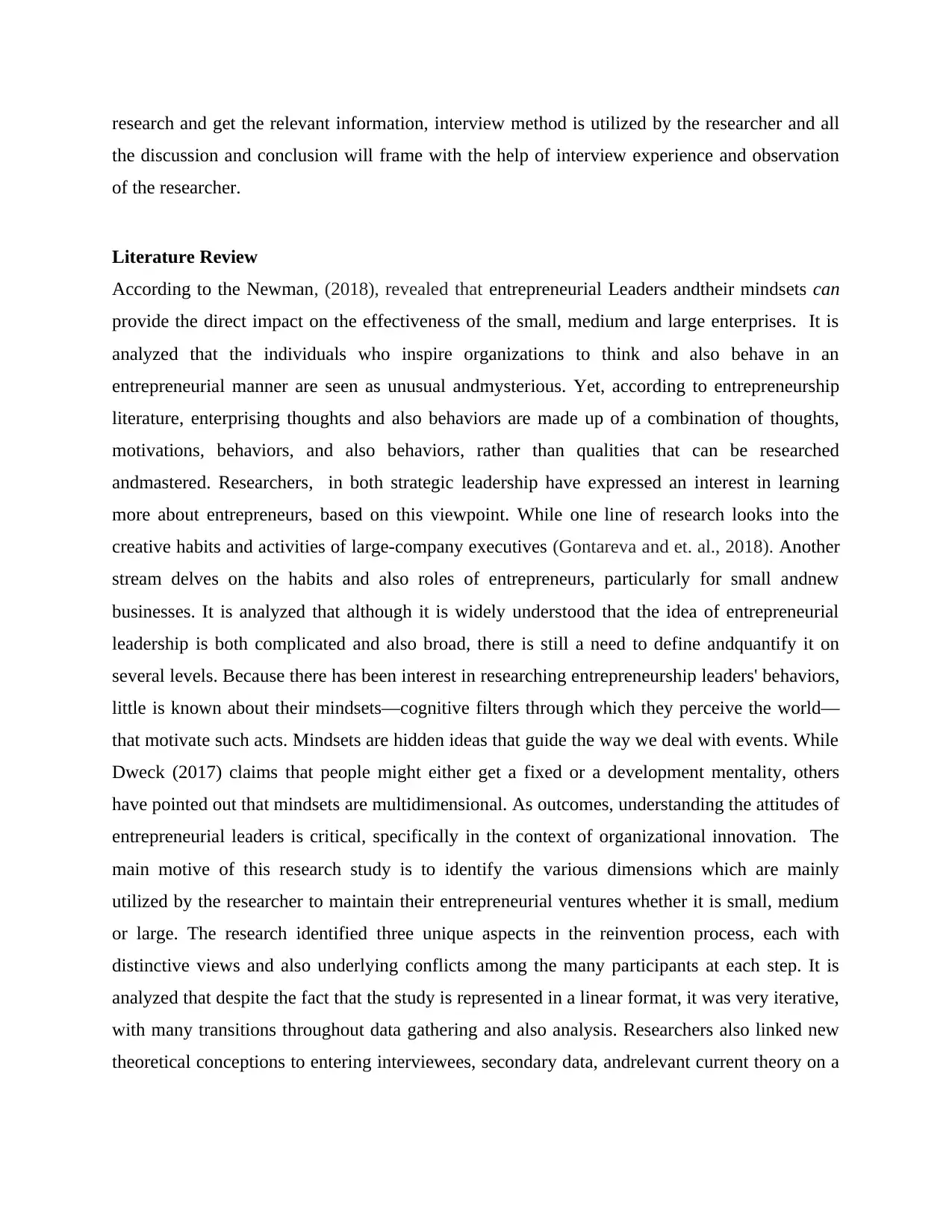
research and get the relevant information, interview method is utilized by the researcher and all
the discussion and conclusion will frame with the help of interview experience and observation
of the researcher.
Literature Review
According to the Newman, (2018), revealed that entrepreneurial Leaders andtheir mindsets can
provide the direct impact on the effectiveness of the small, medium and large enterprises. It is
analyzed that the individuals who inspire organizations to think and also behave in an
entrepreneurial manner are seen as unusual andmysterious. Yet, according to entrepreneurship
literature, enterprising thoughts and also behaviors are made up of a combination of thoughts,
motivations, behaviors, and also behaviors, rather than qualities that can be researched
andmastered. Researchers, in both strategic leadership have expressed an interest in learning
more about entrepreneurs, based on this viewpoint. While one line of research looks into the
creative habits and activities of large-company executives (Gontareva and et. al., 2018). Another
stream delves on the habits and also roles of entrepreneurs, particularly for small andnew
businesses. It is analyzed that although it is widely understood that the idea of entrepreneurial
leadership is both complicated and also broad, there is still a need to define andquantify it on
several levels. Because there has been interest in researching entrepreneurship leaders' behaviors,
little is known about their mindsets—cognitive filters through which they perceive the world—
that motivate such acts. Mindsets are hidden ideas that guide the way we deal with events. While
Dweck (2017) claims that people might either get a fixed or a development mentality, others
have pointed out that mindsets are multidimensional. As outcomes, understanding the attitudes of
entrepreneurial leaders is critical, specifically in the context of organizational innovation. The
main motive of this research study is to identify the various dimensions which are mainly
utilized by the researcher to maintain their entrepreneurial ventures whether it is small, medium
or large. The research identified three unique aspects in the reinvention process, each with
distinctive views and also underlying conflicts among the many participants at each step. It is
analyzed that despite the fact that the study is represented in a linear format, it was very iterative,
with many transitions throughout data gathering and also analysis. Researchers also linked new
theoretical conceptions to entering interviewees, secondary data, andrelevant current theory on a
the discussion and conclusion will frame with the help of interview experience and observation
of the researcher.
Literature Review
According to the Newman, (2018), revealed that entrepreneurial Leaders andtheir mindsets can
provide the direct impact on the effectiveness of the small, medium and large enterprises. It is
analyzed that the individuals who inspire organizations to think and also behave in an
entrepreneurial manner are seen as unusual andmysterious. Yet, according to entrepreneurship
literature, enterprising thoughts and also behaviors are made up of a combination of thoughts,
motivations, behaviors, and also behaviors, rather than qualities that can be researched
andmastered. Researchers, in both strategic leadership have expressed an interest in learning
more about entrepreneurs, based on this viewpoint. While one line of research looks into the
creative habits and activities of large-company executives (Gontareva and et. al., 2018). Another
stream delves on the habits and also roles of entrepreneurs, particularly for small andnew
businesses. It is analyzed that although it is widely understood that the idea of entrepreneurial
leadership is both complicated and also broad, there is still a need to define andquantify it on
several levels. Because there has been interest in researching entrepreneurship leaders' behaviors,
little is known about their mindsets—cognitive filters through which they perceive the world—
that motivate such acts. Mindsets are hidden ideas that guide the way we deal with events. While
Dweck (2017) claims that people might either get a fixed or a development mentality, others
have pointed out that mindsets are multidimensional. As outcomes, understanding the attitudes of
entrepreneurial leaders is critical, specifically in the context of organizational innovation. The
main motive of this research study is to identify the various dimensions which are mainly
utilized by the researcher to maintain their entrepreneurial ventures whether it is small, medium
or large. The research identified three unique aspects in the reinvention process, each with
distinctive views and also underlying conflicts among the many participants at each step. It is
analyzed that despite the fact that the study is represented in a linear format, it was very iterative,
with many transitions throughout data gathering and also analysis. Researchers also linked new
theoretical conceptions to entering interviewees, secondary data, andrelevant current theory on a
Paraphrase This Document
Need a fresh take? Get an instant paraphrase of this document with our AI Paraphraser
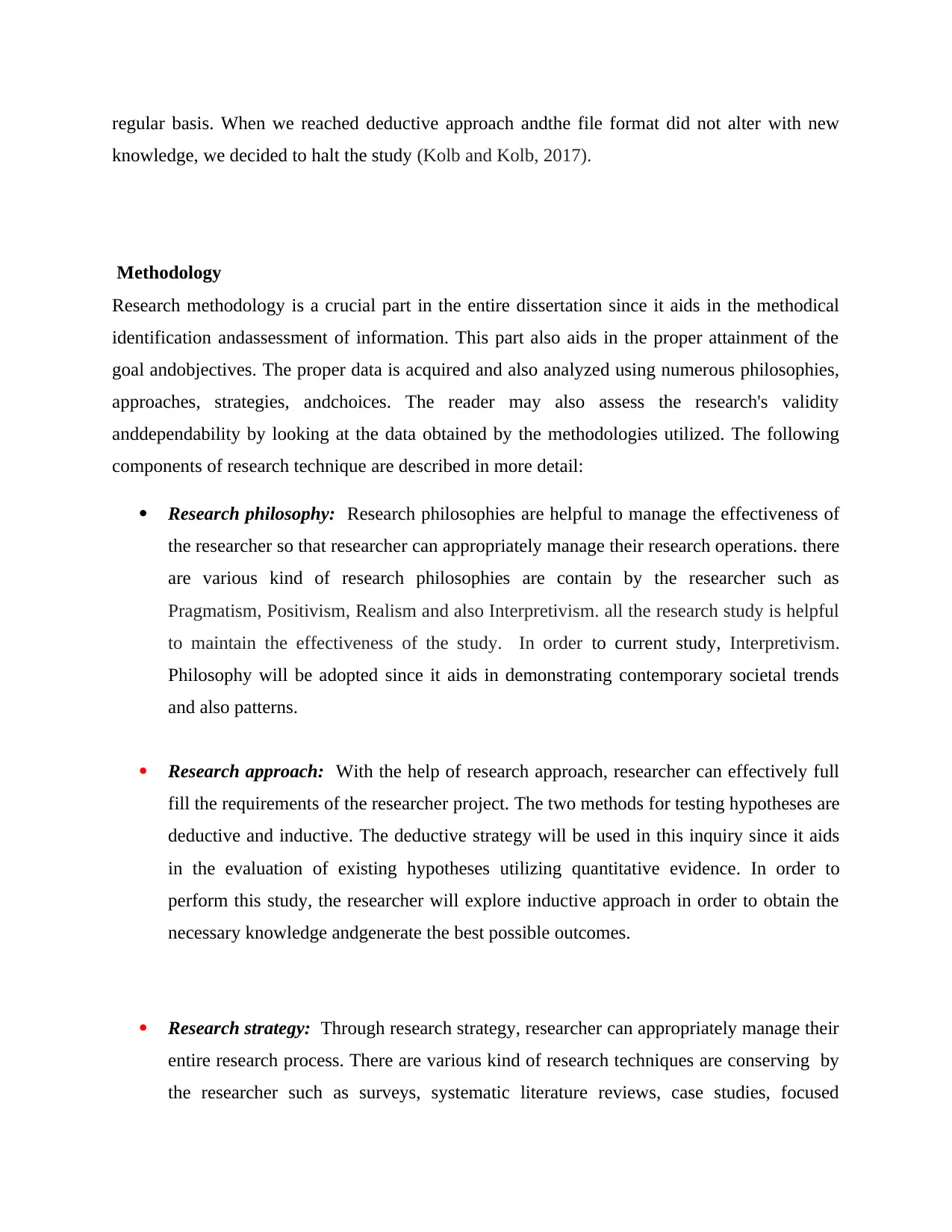
regular basis. When we reached deductive approach andthe file format did not alter with new
knowledge, we decided to halt the study (Kolb and Kolb, 2017).
Methodology
Research methodology is a crucial part in the entire dissertation since it aids in the methodical
identification andassessment of information. This part also aids in the proper attainment of the
goal andobjectives. The proper data is acquired and also analyzed using numerous philosophies,
approaches, strategies, andchoices. The reader may also assess the research's validity
anddependability by looking at the data obtained by the methodologies utilized. The following
components of research technique are described in more detail:
Research philosophy: Research philosophies are helpful to manage the effectiveness of
the researcher so that researcher can appropriately manage their research operations. there
are various kind of research philosophies are contain by the researcher such as
Pragmatism, Positivism, Realism and also Interpretivism. all the research study is helpful
to maintain the effectiveness of the study. In order to current study, Interpretivism.
Philosophy will be adopted since it aids in demonstrating contemporary societal trends
and also patterns.
Research approach: With the help of research approach, researcher can effectively full
fill the requirements of the researcher project. The two methods for testing hypotheses are
deductive and inductive. The deductive strategy will be used in this inquiry since it aids
in the evaluation of existing hypotheses utilizing quantitative evidence. In order to
perform this study, the researcher will explore inductive approach in order to obtain the
necessary knowledge andgenerate the best possible outcomes.
Research strategy: Through research strategy, researcher can appropriately manage their
entire research process. There are various kind of research techniques are conserving by
the researcher such as surveys, systematic literature reviews, case studies, focused
knowledge, we decided to halt the study (Kolb and Kolb, 2017).
Methodology
Research methodology is a crucial part in the entire dissertation since it aids in the methodical
identification andassessment of information. This part also aids in the proper attainment of the
goal andobjectives. The proper data is acquired and also analyzed using numerous philosophies,
approaches, strategies, andchoices. The reader may also assess the research's validity
anddependability by looking at the data obtained by the methodologies utilized. The following
components of research technique are described in more detail:
Research philosophy: Research philosophies are helpful to manage the effectiveness of
the researcher so that researcher can appropriately manage their research operations. there
are various kind of research philosophies are contain by the researcher such as
Pragmatism, Positivism, Realism and also Interpretivism. all the research study is helpful
to maintain the effectiveness of the study. In order to current study, Interpretivism.
Philosophy will be adopted since it aids in demonstrating contemporary societal trends
and also patterns.
Research approach: With the help of research approach, researcher can effectively full
fill the requirements of the researcher project. The two methods for testing hypotheses are
deductive and inductive. The deductive strategy will be used in this inquiry since it aids
in the evaluation of existing hypotheses utilizing quantitative evidence. In order to
perform this study, the researcher will explore inductive approach in order to obtain the
necessary knowledge andgenerate the best possible outcomes.
Research strategy: Through research strategy, researcher can appropriately manage their
entire research process. There are various kind of research techniques are conserving by
the researcher such as surveys, systematic literature reviews, case studies, focused
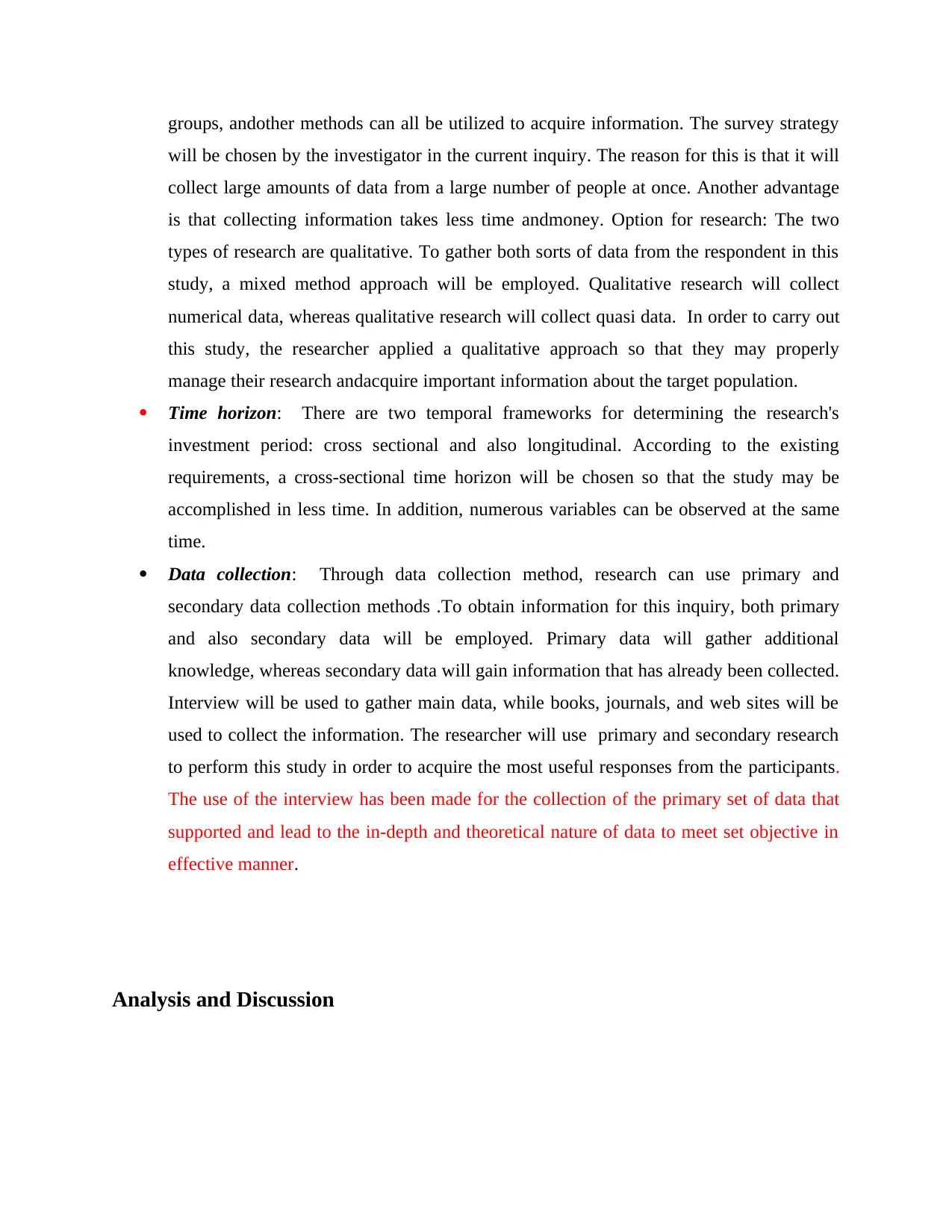
groups, andother methods can all be utilized to acquire information. The survey strategy
will be chosen by the investigator in the current inquiry. The reason for this is that it will
collect large amounts of data from a large number of people at once. Another advantage
is that collecting information takes less time andmoney. Option for research: The two
types of research are qualitative. To gather both sorts of data from the respondent in this
study, a mixed method approach will be employed. Qualitative research will collect
numerical data, whereas qualitative research will collect quasi data. In order to carry out
this study, the researcher applied a qualitative approach so that they may properly
manage their research andacquire important information about the target population.
Time horizon: There are two temporal frameworks for determining the research's
investment period: cross sectional and also longitudinal. According to the existing
requirements, a cross-sectional time horizon will be chosen so that the study may be
accomplished in less time. In addition, numerous variables can be observed at the same
time.
Data collection: Through data collection method, research can use primary and
secondary data collection methods .To obtain information for this inquiry, both primary
and also secondary data will be employed. Primary data will gather additional
knowledge, whereas secondary data will gain information that has already been collected.
Interview will be used to gather main data, while books, journals, and web sites will be
used to collect the information. The researcher will use primary and secondary research
to perform this study in order to acquire the most useful responses from the participants.
The use of the interview has been made for the collection of the primary set of data that
supported and lead to the in-depth and theoretical nature of data to meet set objective in
effective manner.
Analysis and Discussion
will be chosen by the investigator in the current inquiry. The reason for this is that it will
collect large amounts of data from a large number of people at once. Another advantage
is that collecting information takes less time andmoney. Option for research: The two
types of research are qualitative. To gather both sorts of data from the respondent in this
study, a mixed method approach will be employed. Qualitative research will collect
numerical data, whereas qualitative research will collect quasi data. In order to carry out
this study, the researcher applied a qualitative approach so that they may properly
manage their research andacquire important information about the target population.
Time horizon: There are two temporal frameworks for determining the research's
investment period: cross sectional and also longitudinal. According to the existing
requirements, a cross-sectional time horizon will be chosen so that the study may be
accomplished in less time. In addition, numerous variables can be observed at the same
time.
Data collection: Through data collection method, research can use primary and
secondary data collection methods .To obtain information for this inquiry, both primary
and also secondary data will be employed. Primary data will gather additional
knowledge, whereas secondary data will gain information that has already been collected.
Interview will be used to gather main data, while books, journals, and web sites will be
used to collect the information. The researcher will use primary and secondary research
to perform this study in order to acquire the most useful responses from the participants.
The use of the interview has been made for the collection of the primary set of data that
supported and lead to the in-depth and theoretical nature of data to meet set objective in
effective manner.
Analysis and Discussion
⊘ This is a preview!⊘
Do you want full access?
Subscribe today to unlock all pages.

Trusted by 1+ million students worldwide
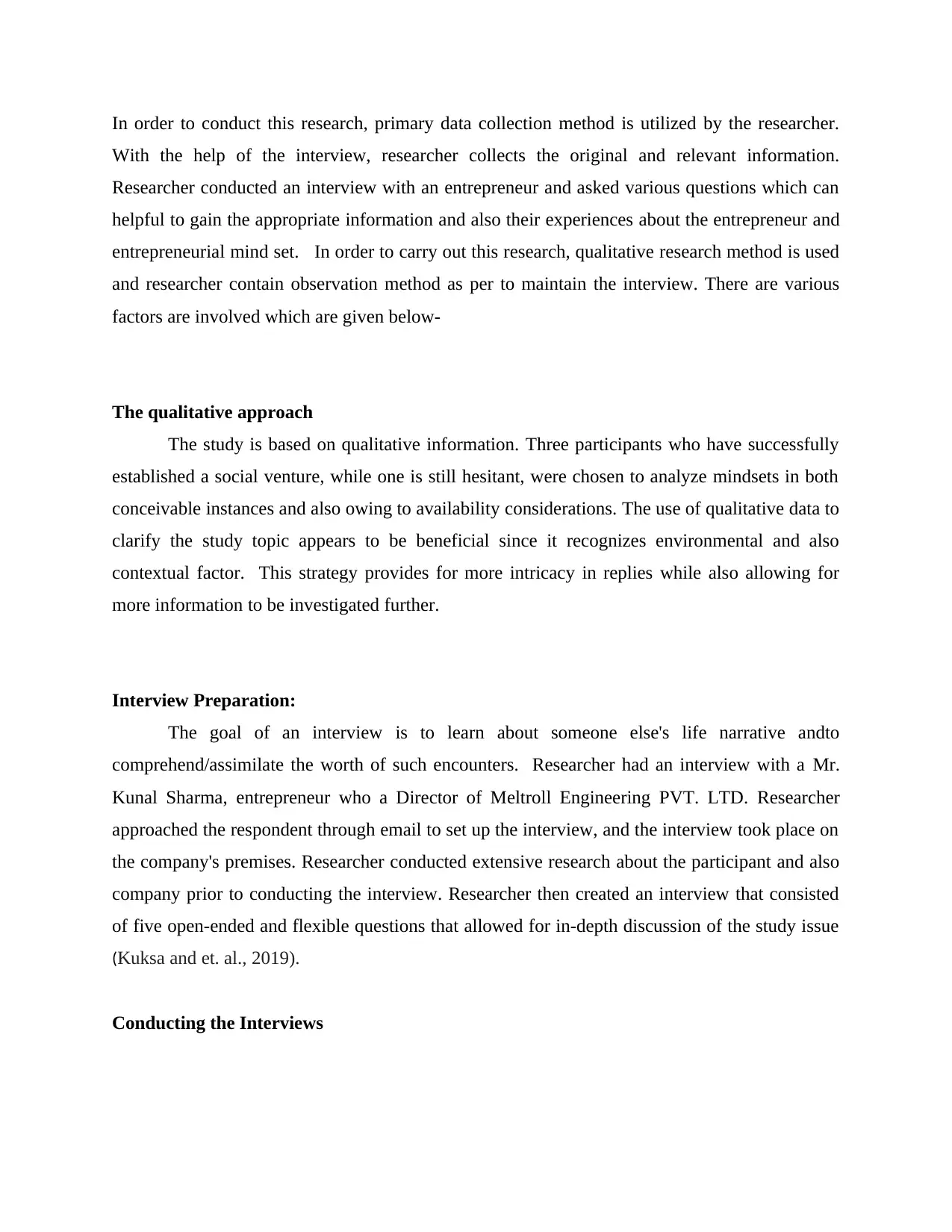
In order to conduct this research, primary data collection method is utilized by the researcher.
With the help of the interview, researcher collects the original and relevant information.
Researcher conducted an interview with an entrepreneur and asked various questions which can
helpful to gain the appropriate information and also their experiences about the entrepreneur and
entrepreneurial mind set. In order to carry out this research, qualitative research method is used
and researcher contain observation method as per to maintain the interview. There are various
factors are involved which are given below-
The qualitative approach
The study is based on qualitative information. Three participants who have successfully
established a social venture, while one is still hesitant, were chosen to analyze mindsets in both
conceivable instances and also owing to availability considerations. The use of qualitative data to
clarify the study topic appears to be beneficial since it recognizes environmental and also
contextual factor. This strategy provides for more intricacy in replies while also allowing for
more information to be investigated further.
Interview Preparation:
The goal of an interview is to learn about someone else's life narrative andto
comprehend/assimilate the worth of such encounters. Researcher had an interview with a Mr.
Kunal Sharma, entrepreneur who a Director of Meltroll Engineering PVT. LTD. Researcher
approached the respondent through email to set up the interview, and the interview took place on
the company's premises. Researcher conducted extensive research about the participant and also
company prior to conducting the interview. Researcher then created an interview that consisted
of five open-ended and flexible questions that allowed for in-depth discussion of the study issue
(Kuksa and et. al., 2019).
Conducting the Interviews
With the help of the interview, researcher collects the original and relevant information.
Researcher conducted an interview with an entrepreneur and asked various questions which can
helpful to gain the appropriate information and also their experiences about the entrepreneur and
entrepreneurial mind set. In order to carry out this research, qualitative research method is used
and researcher contain observation method as per to maintain the interview. There are various
factors are involved which are given below-
The qualitative approach
The study is based on qualitative information. Three participants who have successfully
established a social venture, while one is still hesitant, were chosen to analyze mindsets in both
conceivable instances and also owing to availability considerations. The use of qualitative data to
clarify the study topic appears to be beneficial since it recognizes environmental and also
contextual factor. This strategy provides for more intricacy in replies while also allowing for
more information to be investigated further.
Interview Preparation:
The goal of an interview is to learn about someone else's life narrative andto
comprehend/assimilate the worth of such encounters. Researcher had an interview with a Mr.
Kunal Sharma, entrepreneur who a Director of Meltroll Engineering PVT. LTD. Researcher
approached the respondent through email to set up the interview, and the interview took place on
the company's premises. Researcher conducted extensive research about the participant and also
company prior to conducting the interview. Researcher then created an interview that consisted
of five open-ended and flexible questions that allowed for in-depth discussion of the study issue
(Kuksa and et. al., 2019).
Conducting the Interviews
Paraphrase This Document
Need a fresh take? Get an instant paraphrase of this document with our AI Paraphraser
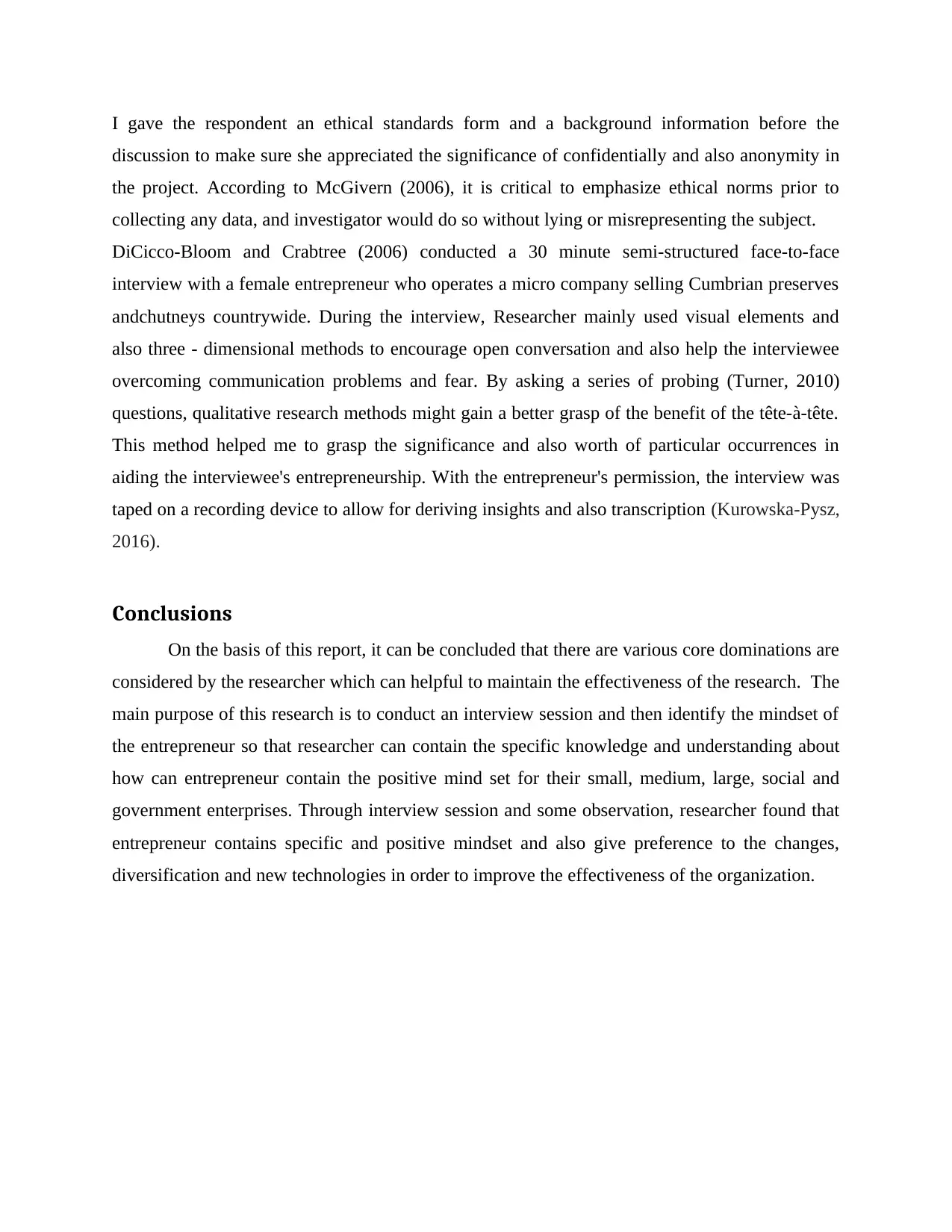
I gave the respondent an ethical standards form and a background information before the
discussion to make sure she appreciated the significance of confidentially and also anonymity in
the project. According to McGivern (2006), it is critical to emphasize ethical norms prior to
collecting any data, and investigator would do so without lying or misrepresenting the subject.
DiCicco-Bloom and Crabtree (2006) conducted a 30 minute semi-structured face-to-face
interview with a female entrepreneur who operates a micro company selling Cumbrian preserves
andchutneys countrywide. During the interview, Researcher mainly used visual elements and
also three - dimensional methods to encourage open conversation and also help the interviewee
overcoming communication problems and fear. By asking a series of probing (Turner, 2010)
questions, qualitative research methods might gain a better grasp of the benefit of the tête-à-tête.
This method helped me to grasp the significance and also worth of particular occurrences in
aiding the interviewee's entrepreneurship. With the entrepreneur's permission, the interview was
taped on a recording device to allow for deriving insights and also transcription (Kurowska-Pysz,
2016).
Conclusions
On the basis of this report, it can be concluded that there are various core dominations are
considered by the researcher which can helpful to maintain the effectiveness of the research. The
main purpose of this research is to conduct an interview session and then identify the mindset of
the entrepreneur so that researcher can contain the specific knowledge and understanding about
how can entrepreneur contain the positive mind set for their small, medium, large, social and
government enterprises. Through interview session and some observation, researcher found that
entrepreneur contains specific and positive mindset and also give preference to the changes,
diversification and new technologies in order to improve the effectiveness of the organization.
discussion to make sure she appreciated the significance of confidentially and also anonymity in
the project. According to McGivern (2006), it is critical to emphasize ethical norms prior to
collecting any data, and investigator would do so without lying or misrepresenting the subject.
DiCicco-Bloom and Crabtree (2006) conducted a 30 minute semi-structured face-to-face
interview with a female entrepreneur who operates a micro company selling Cumbrian preserves
andchutneys countrywide. During the interview, Researcher mainly used visual elements and
also three - dimensional methods to encourage open conversation and also help the interviewee
overcoming communication problems and fear. By asking a series of probing (Turner, 2010)
questions, qualitative research methods might gain a better grasp of the benefit of the tête-à-tête.
This method helped me to grasp the significance and also worth of particular occurrences in
aiding the interviewee's entrepreneurship. With the entrepreneur's permission, the interview was
taped on a recording device to allow for deriving insights and also transcription (Kurowska-Pysz,
2016).
Conclusions
On the basis of this report, it can be concluded that there are various core dominations are
considered by the researcher which can helpful to maintain the effectiveness of the research. The
main purpose of this research is to conduct an interview session and then identify the mindset of
the entrepreneur so that researcher can contain the specific knowledge and understanding about
how can entrepreneur contain the positive mind set for their small, medium, large, social and
government enterprises. Through interview session and some observation, researcher found that
entrepreneur contains specific and positive mindset and also give preference to the changes,
diversification and new technologies in order to improve the effectiveness of the organization.
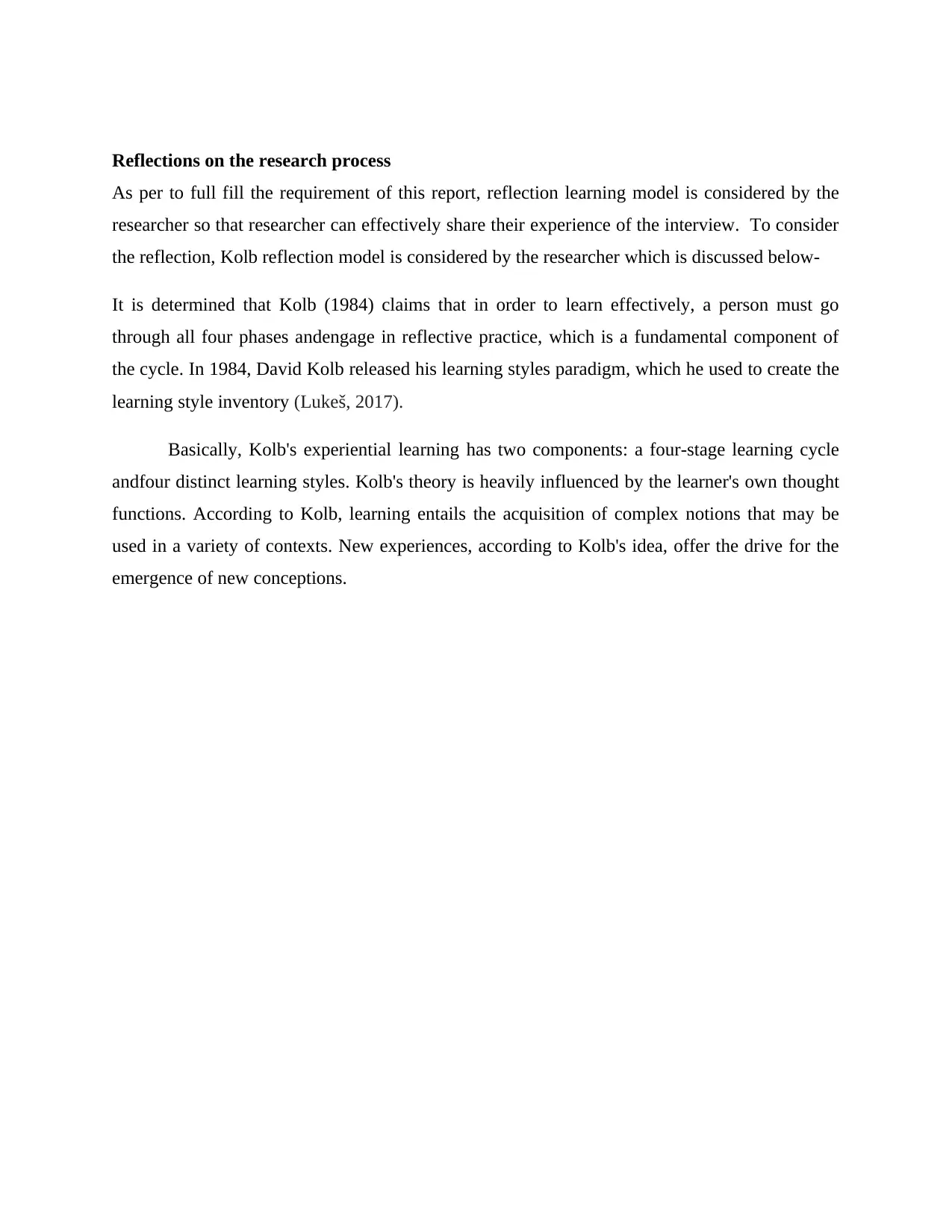
Reflections on the research process
As per to full fill the requirement of this report, reflection learning model is considered by the
researcher so that researcher can effectively share their experience of the interview. To consider
the reflection, Kolb reflection model is considered by the researcher which is discussed below-
It is determined that Kolb (1984) claims that in order to learn effectively, a person must go
through all four phases andengage in reflective practice, which is a fundamental component of
the cycle. In 1984, David Kolb released his learning styles paradigm, which he used to create the
learning style inventory (Lukeš, 2017).
Basically, Kolb's experiential learning has two components: a four-stage learning cycle
andfour distinct learning styles. Kolb's theory is heavily influenced by the learner's own thought
functions. According to Kolb, learning entails the acquisition of complex notions that may be
used in a variety of contexts. New experiences, according to Kolb's idea, offer the drive for the
emergence of new conceptions.
As per to full fill the requirement of this report, reflection learning model is considered by the
researcher so that researcher can effectively share their experience of the interview. To consider
the reflection, Kolb reflection model is considered by the researcher which is discussed below-
It is determined that Kolb (1984) claims that in order to learn effectively, a person must go
through all four phases andengage in reflective practice, which is a fundamental component of
the cycle. In 1984, David Kolb released his learning styles paradigm, which he used to create the
learning style inventory (Lukeš, 2017).
Basically, Kolb's experiential learning has two components: a four-stage learning cycle
andfour distinct learning styles. Kolb's theory is heavily influenced by the learner's own thought
functions. According to Kolb, learning entails the acquisition of complex notions that may be
used in a variety of contexts. New experiences, according to Kolb's idea, offer the drive for the
emergence of new conceptions.
⊘ This is a preview!⊘
Do you want full access?
Subscribe today to unlock all pages.

Trusted by 1+ million students worldwide
1 out of 18
Related Documents
Your All-in-One AI-Powered Toolkit for Academic Success.
+13062052269
info@desklib.com
Available 24*7 on WhatsApp / Email
![[object Object]](/_next/static/media/star-bottom.7253800d.svg)
Unlock your academic potential
Copyright © 2020–2026 A2Z Services. All Rights Reserved. Developed and managed by ZUCOL.





